James Gunn, the king of superhero movies: ‘Not many people get to make movies at my budget level and still do what they want’
The filmmaker talks to EL PAÍS about ‘Guardians of the Galaxy,’ his plans for the DC universe and how the creative process has helped him as a person
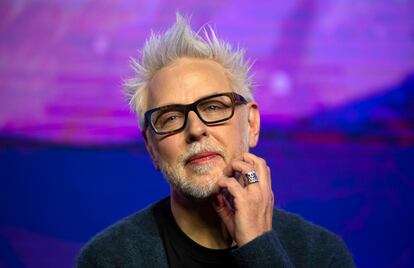
One of the most famous methods for falling asleep is counting sheep. However, for James Gunn, what worked for him was choreographing action sequences in his head. That was the last thing he did before drifting off. What’s so relaxing about picturing fights, leaps and somersaults? Who knows. It may have something to do with the fact that the filmmaker’s brain cannot slow down, even at night. He himself admits that his mind constantly wanders off, no matter what he is doing. “The worst part is that I talk to myself sometimes, and I don’t know that I’m doing it. It’s like I’m mumbling dialog, or music or something,” he says. His wife inevtiably catches him and brings him back to reality.
Speaking in a Paris hotel, the director seemed focused on the conversation. But you never know: rarely has his brain accumulated as many tasks, emotions and stimuli as these days. On one hand, he was presenting the recently released Guardians of the Galaxy Vol. 3, the final part of the most peculiar trilogy of Marvel superhero movies — a film that, incidentally, he was not supposed to direct, because Disney fired him after the second movie in light of some old jokes he made about pedophilia, rape and 9/11 on Twitter.

However, the protests from the cast and the public forced the company to back down. They saved the project, but a little too late: Gunn had already signed with Marvel’s arch-rival, DC. First, to direct The Suicide Squad. And then, as soon as the promotion with Marvel ends, Gunn will set his sights on shaping stories for Superman, Wonder Woman and other DC characters in movies, series and video games. The name that was chosen for the first phase of the project may offer a clue: Gods and Monsters.
“I don’t think there’s ever been a storyteller in charge. It’s unprecedented. No one in the history of Hollywood has ever had an opportunity to tell the biggest story ever told across television, film and games, to have that type of creative outlet. So how the fuck could I say no?” This dispels any doubts there could be regarding his decision to join DC. The studio has been experiencing ups and downs for years, triumphing with Christopher Nolan’s Batman trilogy and Todd Philips’ recent Joker, but having less success with Batgirl, which was canceled, Black Adam, which was a box office disaster, and Batman v Superman, Suicide Squad (not Gunn’s, but one with almost the same name) and Justice League, which all received terrible reviews. No one, until today, had proven to have the superpower of being able to draw up a coherent long-term plan.
To solve such an unusual situation, the company has turned to a mind that is just as unusual. As a child, Gunn was obsessed with inventing alien races, complete with pets, homes and even a hydraulic network for each planet in the solar system. Today, he explains that his creative process is “like being a journalist,” observing and transcribing plots and conversations that never stop in his head. And as strange as it sounds, it works. “There aren’t too many people that get to make movies at the budget level that I’m able to make them and still do exactly what they want,” he says.
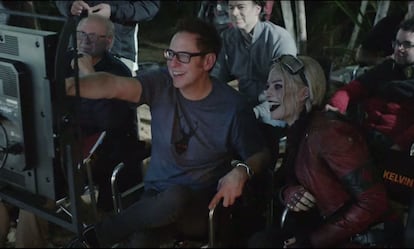
Like what? Like demanding expensive songs such as Radiohead´s Creep for the third installment of Guardians of the Galaxy; shooting visually stunning sequences, sparing no expense; adding a dark twist (and a few expletives, something forbidden until now) to a film made by the ever-merry Marvel Studios; pushing his cast to repeat the shots endless times; or even getting Disney to eat their words. “The offensive attitude and the statements discovered on James’ Twitter are indefensible and incompatible with our values,” stated Alan Horn, the boss at the time, in 2018, when he fired the filmmaker who ended up being reinstated, something that also spurred the imaginations of the fans who are dreaming up a film that brings together the heroes of Marvel and DC. With Gunn and the freedom he enjoys at the helm, of course, there’s a better chance of that happnening. “In 10 years,” Gunn laughs.
The filmmaker attributes his current status to the first and highly celebrated installment of Guardians of the Galaxy. That is also perhaps when his trademark style — a mix of rock, epic slow-mo, absurd humor and a desire to risk and amaze — began to be recognized. But the applause came earlier, as well as his connection with the audience. In March 2004, for the first time in the U.S., a film that led the box office for a week, Dawn of the Dead, was dethroned by another by the same scriptwriter, Scooby-Doo 2: Monsters Unleashed.
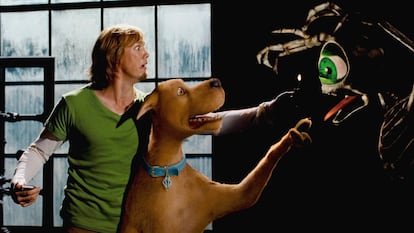
A man of many talents
Gunn tends to take pride in a career that he built by himself with his own talent and effort. There was a time when the most powerful creator of commercial cinema used to serve clients in a bar and look after patients as a nurse; he also worked in a quarry and sang in seedy dives. “I was finding my way. But I always knew that I was an artist,” he points out.
One thing was what put bread on the table; another, his dream. Since he was a child, Gunn has drawn comics, composed music, started bands, taken photos, acted and written novels. His first film, made when he was 11, consisted of a string of fake commercials “made with the kids in the neighborhood.” Other homemade horror movies brought Friday the 13th to mind: “I can’t make Star Wars, but I could make that,” he recalls thinking at the time. Then, passion and work finally coincided: he was asked to write the script for Lloyd Kaufman’s Tromeo and Juliet (1996). “I was just kind of desperate to make a living doing something creative. When I started working in the film industry, it was almost like my backup, if that makes any sense. I was a rock star, you know, a novelist... now I’m going to sell out and go make movies.” Chris Pratt, star of Guardians of the Galaxy, puts it differently: he says that Gunn was “born to do it.”
Maybe this is why Gunn values so much the path he has traveled. And although he notes that money does buy a lot of creative freedom, he warns: “The budget can be a trap because people can rely on it too much. But the budget won’t make a good movie. Sometimes having restrictions placed upon you can really help you, even when you make movies like this. I would say 90% of the time I’ve had restrictions placed on me, it’s made the movie better, not worse, because somehow I’m able to make things more streamlined, you really you cut out the things you don’t need and you keep the stuff that you do.”
His team also helps him a lot. Gunn believes that, even though years ago he placed too much trust in people who did not deserve it, today he is surrounded by talent that is able to bring his boundless imagination to reality, often even improving it. “Part of [the process] is me; you need to have a good foundation, a good story. But then part of it is finding the right people to surround yourself with,” he reflects. Today he even enjoys the power to take certain collaborators with him wherever he goes.
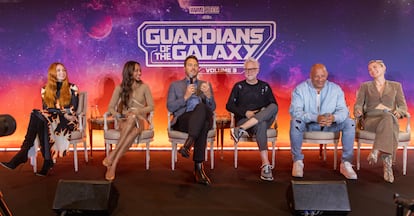
Right now that will not be possible with the Guardians of the Galaxy, however. This is also why his end at Marvel comes with a certain sadness, apart from the relief of being satisfied with the result. “We’ve been like a family,” he says. “Every single group of actors is like, they love each other, but usually they don’t. It’s not like that with us.” So much so, that he talks to Pratt at least twice a week.
Defending the superheroes
In addition to the infamous tweets that got him briefly fired — of which Gunn himself expressed regret about after the scandal — the director’s Twitter account also shows his vision without mincing words. After the success of Deadpool, in 2016, he encouraged his peers to learn the lesson: more unique films, less copies. Has it been achieved? “Infinity War and Endgame were totally unique. The first Shazam! movie was high concept comedy. So I think that there’s been really interesting films. I wish there were more, but yeah.”
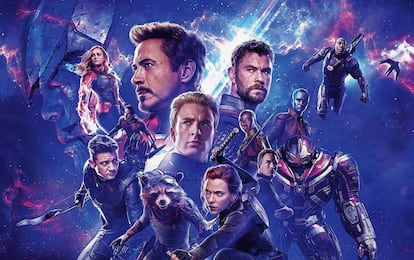
Gunn has also defended superhero films from those who, like Martin Scorsese, dismiss them as second-rate works or accuse them of overwhelming, repeating themselves and becoming tiresome. To say that a type of film is not cinema because of its subject or characters is ridiculous, he argues. And now he has an unprecedented opportunity to prove it: for Legacy, the new Superman film, he will get behind the camera. In the animated series Creature Commandos he is directing the actors and their voices. And in other cases, he will choose the director and supervise. “I’m hiring great directors and great writers. It’s going to be interesting stuff, if nothing else. That’s what I’d rather make, stuff that’s interesting and doesn’t work, than stuff that is just the same old thing that we’ve seen again and again.”
After all, throwing himself into creating stories not only brings him applause and money. Apparently, it also helps him live better: “My demons change over the years. I was an alcoholic as a young person, and a drug addict. I went through a number of crazy years. I think that for me, it’s really about focusing on the creative process and not being distracted by money, power, attention, negativity, and just focusing on the creative process. If I can do that, then everything works out really well. It still can be a struggle, mentally. But life is difficult enough without me making it more difficult.” Better to imagine the battles of others. And how to stage them. It may even help you sleep.
Sign up for our weekly newsletter to get more English-language news coverage from EL PAÍS USA Edition
Tu suscripción se está usando en otro dispositivo
¿Quieres añadir otro usuario a tu suscripción?
Si continúas leyendo en este dispositivo, no se podrá leer en el otro.
FlechaTu suscripción se está usando en otro dispositivo y solo puedes acceder a EL PAÍS desde un dispositivo a la vez.
Si quieres compartir tu cuenta, cambia tu suscripción a la modalidad Premium, así podrás añadir otro usuario. Cada uno accederá con su propia cuenta de email, lo que os permitirá personalizar vuestra experiencia en EL PAÍS.
¿Tienes una suscripción de empresa? Accede aquí para contratar más cuentas.
En el caso de no saber quién está usando tu cuenta, te recomendamos cambiar tu contraseña aquí.
Si decides continuar compartiendo tu cuenta, este mensaje se mostrará en tu dispositivo y en el de la otra persona que está usando tu cuenta de forma indefinida, afectando a tu experiencia de lectura. Puedes consultar aquí los términos y condiciones de la suscripción digital.









































